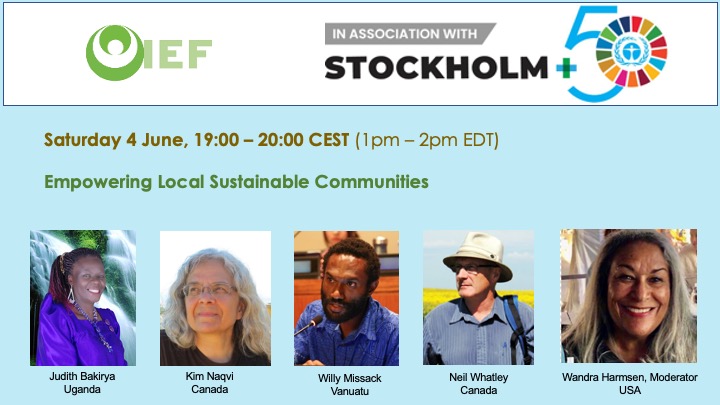
Empowering Local Sustainable Communities
4 June 2022
Part of the 26th CONFERENCE OF THE INTERNATIONAL ENVIRONMENT FORUM
WEBINAR REPORT
The panelists discussed how local sustainable communities can be empowered with a culture of learning, adapting science for everyone, reading the local reality, and consulting to achieve resilience, regeneration, climate mitigation and adaptation, with panelists presenting case studies from around the world.
Panelists:
- Kim Naqvi (Canada) Teaching the Cultural and Political Dimensions of Sustainable Consumption
- Judith Bakirya (Uganda) Agroecology enterprises are key catalysts to empowering local sustainable communities in Africa
- Gary Reusche (Ukraine)
- Neil Whatley (Canada) Empowering Farmers Leads to Sustainable Agriculture
Moderator: Wandra Harmsen (USA)
For speaker bios, scroll down.
Webinar Report
In her opening remarks, moderator Wandra Harmsen (USA) announced the launching of the statement by the Baha’i International Community One Planet, One Habitation - A Bahá’í Perspective on Recasting Humanity's Relationship with the Natural World. She then encouraged the audience to reflect during the webinar on how we can have a constructive and collaborative relationship between people and the environment.
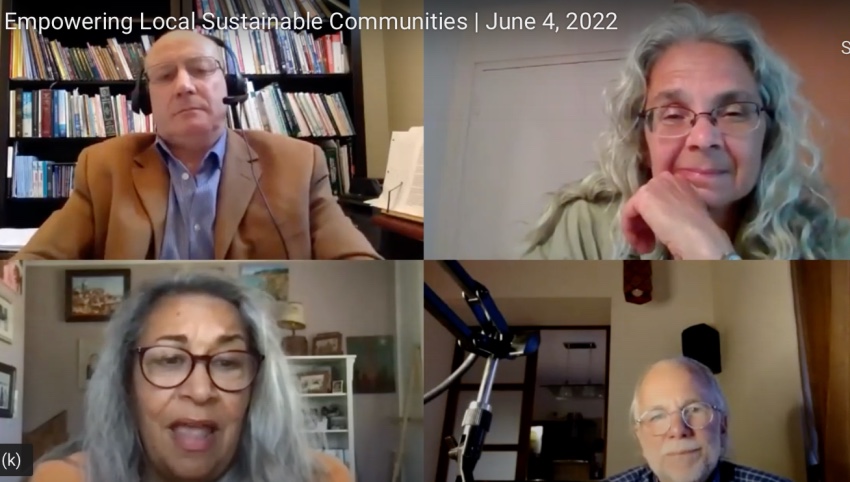
(top) Neil Whatley, Kim Naqvi, (bottom) Wandra Harmsen, Gary Reusche
Kim Naqvi (Canada) Teaching the Cultural and Political Dimensions of Sustainable Consumption
Kim Naqvi explained that consumption is really a relationship between people and things. She said that one of the multiple forces we are up against is that lessening our consumption is deemed bad. Humans in the West express themselves through consuming which drives consumerism and the growth economy. Kim wants to change the narrative on consumption by reframing it as the human spirit in action. The notion behind consumption should change from things to relationships.
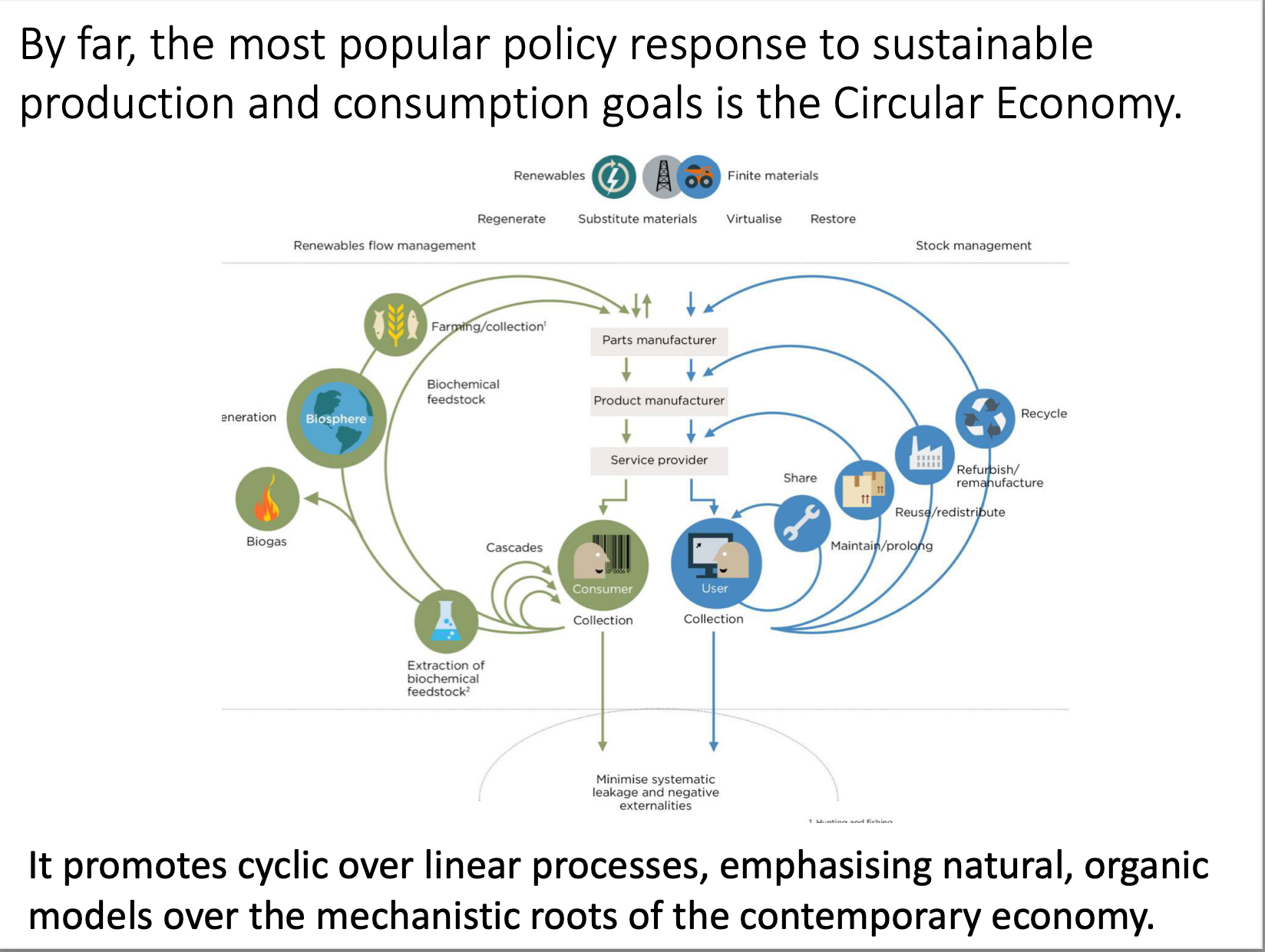
The most popular approach to addressing consumption is with the idea of a circular economy. She questioned though whether a circular economy would not be hijacked by capitalism by merely shifting investment targets. It seems to favor business, not local political action. She said that while a circular economy has potential it is still part of a profit-driven economy. We need change at a more fundamental level that addresses cultural and behavioral issues.
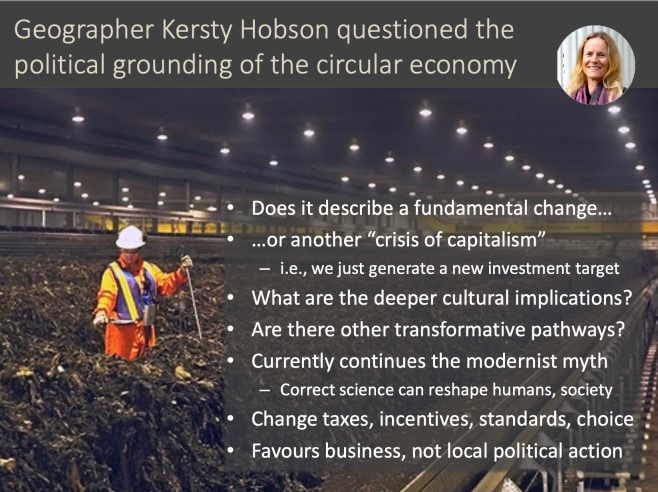
Answering a question from the chat, Kim said that social media don’t sell things, they sell identity, community, and stories. In the absence of other goals, our search for belonging gets grabbed by the advertising industry that promotes certain behavior and practices. Consumption has taken the place of community, but when you recognize that this is a loss, it will give you strength so you can take the community back.
Kim ended her talk with the practical example of composting. While municipal pick-up of garden waste and kitchen scraps is a step in the right direction, it still requires transportation and is not accessible to all. Community composting empowers communities through active participation and by benefitting from the collaborative process and the product. We need to broaden the current focus on technology with the social dimension.
Judith Bakirya (Uganda) Agroecology enterprises are key catalysts to empowering local sustainable communities in Africa
The internet connection in Uganda was not good enough for Judith to turn on her video.
Judith started her talk by saying that over 80% of East African farmers are smallholder farmers. Agroecology includes indigenous practices that speak to nature and environmental protection. At her farm, Busaino Fruits and Herbs (BUFRUIT), they are not only farmers but also business-people and social entrepreneurs working with local communities, and connecting with policy-makers, banks, potential financers and the rest of the world. They aggregate to find nature-friendly markets, for example, BuFruit connects the Netherlands with Uganda through the trade of Jackfruit.
During the discussion, Judith elaborated more on their Agroecological principles such as diversification and maintaining soil health. Having a large diversity of crops also helps them economically as they have something to sell in all seasons including animals and trees. Judith emphasized that an ecological farm must have a strategy that considers what brings in money in the short, medium, and long term.
At their farm, they also sell knowledge to school children and visitors from the city that come to the farm, and they encourage others to plant trees. During her speech, Judith referred to the recording of a webinar she gave with Patrick Kiirya for the Association of Baha’i Studies Agriculture group in which they elaborated more about their work: https://vimeo.com/496999345 (~24minutes).
Willy Missack (Vanuatu) was unfortunately not able to join us. You may like to watch a 6 min. segment from last year’s conference in which he explained how Vanuatu villages are responding to the challenges of current issues with local ownership and commitment and without creating a dependency on external resources: https://www.youtube.com/watch?v=OAy59GcfSeY Start at 1:12:42
Gary Reusche (Ukraine)
Gary kindly filled in for Willy Missack. His opening question was “What is the future to look like in the coming decades?” Speaking from Ukraine, he pointed out the many existential threats to humanity and the uncertainty about the near future which has become a daily experience for them in the Ukraine. He said that today’s environmental challenges that are global, technical, and economic in nature require new behaviors and new institutions; they need to be reoriented for the future. Structurally, we want to move away from growth-based economies.

Gary argues that high consumption living is not sustainable and not necessary for human well-being. We do not need to be materially rich to live a rich life. By mindfully reducing our living standards we can even improve the quality of our life. We need to unlearn today's consumer culture and explore alternative ways of living that are more sustainable and more fulfilling. We need to work for the well-being of everyone and not just of one country.
Neil Whatley (Canada) Empowering Farmers Leads to Sustainable Agriculture
Neil Whatley explained that, as an agricultural specialist, he has always been drawn to the methodology of Participatory Action Research as proposed in Paulo Freire’s empowerment-based adult learning methodology that values both the knowledge generated by conventional research scientists and traditional knowledge such as generated within rural communities by farmers. This approach aligns perfectly with the Baha’i conceptual framework for engaging in social action.
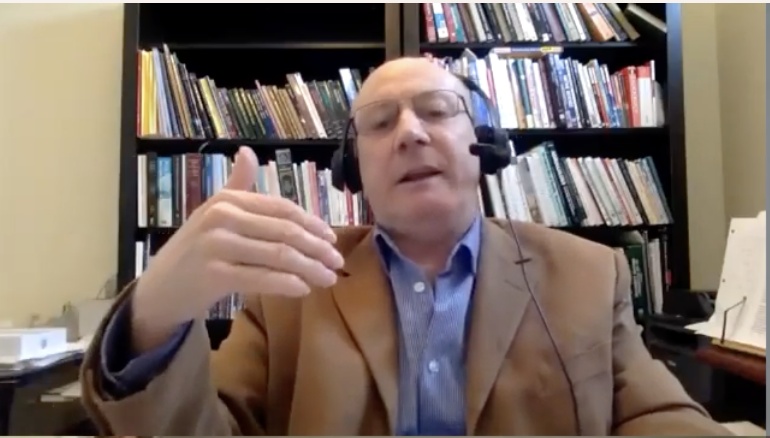
Neil Whatley
In his work, Neil aims to create a safe social space for Indigenous farmers in an environment where the farmer and specialist can learn together in an equal conversation, free of power. He encourages farmers by asking them many questions and by letting them speak more than he does. Many farmers believe that their own knowledge is inferior even though they have been practicing sustainable farming for generations and have gained valuable knowledge, but they seem to be ashamed of it. However, with this empowering approach, the farmers know that Neil genuinely wants to learn more about their practices. Neil made the important point that “their local Indigenous identity is intertwined within the traditional farming system, so by using Indigenous knowledge, we were also retaining important aspects of their unique culture which helped ensure that these people are empowered to walk their own path to development.”
You can read the transcript of the entire talk by Neil Whatley here.
Wandra Harmsen summarized the discussion by saying that the key issues highlighted by every panelist in different ways are the empowerment of Indigenous people, of institutions and communities to work for the common good.
Speaker Bios
Kimberley Naqvi
Kimberley Naqvi (BSc Biology; MA, PhD Geography) is a development and economic geographer whose work focusses on the cultural foundations of economic practice. She teaches human geography at Thompson Rivers University in Kamloops, BC, Canada.
Judith Bakirya
Bakirya Judith is the managing director of Busaino Fruits and Herbs (BUFRUIT). BUFRUIT is an Agoecological enterprise, using permaculture principles, building on indigenous practices of working with the ‘village and farming as ‘forest’. Sitting on 1064 acres of land in Eastern Uganda, the farm strikes a balance between farming, nature, community, culture, education and tourism. Judith and the farm have won several awards among them the BBC World Service 2019 award as one of the “100” most influential women globally doing environmentally and climate friendly farming. She holds a Master’s degree in health and development from Birmingham University UK.
Gary Reusche
Gary combined a PhD in agricultural science with an MBA in management. For 50 years he managed projects in Central America, Africa, South Asia and the ex-Soviet Union. His passion is to correlate Bahá’í social principles with current realities in the world and to work for a sustainable future in a united world. As a social activist, he lives on a small farm where he runs a residential distance education school for children, youth, and university students striving to build a world based on universal spiritual principles.
Neil Whatley
Raised on a farm in Saskatchewan, Neil has ten years of experience working with his parents on the family farm and thirty years of experience working with farmers in crop-based agronomy, applied research and rural community development. Neil has a Bachelor’s degree in crop science and a Master’s in rural social studies. Neil has managed the Saskatchewan Pulse Growers’ farmer participatory applied research program, served as a crop advisor for the Government of Alberta and spent several years facilitating rural development in Latin America. Neil is currently a crop consultant, a faculty member with the web-based Wilmette learning institute and serves on the steering committee for the Rockefeller Foundation funded Canadian Prairie Food System Vision project.
Wandra Harmsen
Wandra grew up in New England with deep roots in the Cape Verdean community of Southeastern Massachusetts. A retired educator, her interests include the study of the coastal environment of Cape Cod and Buzzards Bay as well as the human impact on the natural environment. Wandra is also a founding member of the Bourne – Wareham Race Amity Group and works in both Portugal and New England on issues of equity, diversity and access.

Last updated 10 June 2022
